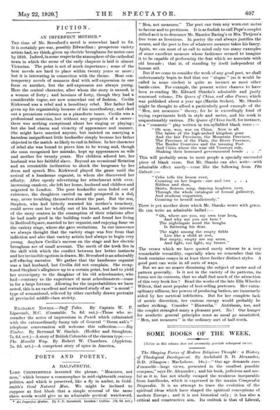POETS AND POETRY.
A HALF.TRUTH.
LORD CHESTERFIELD invented the phrase, " Measures, not men," which became a commonplace in mid-eighteenth century politics, and which is preserved, like a fly in amber, in Gold- smith's Good Natured Man. We might be inclined to suppose at first blush that a simple reversal of the same three words would give us an admirable poetical watchword, • An Imperfect Mother. By .1. D. Beroeford. London : Collins.. [7e. ed. net.] "Men, not measures." The poet can turn any worn-out metre. to favour and to prettiness. It is as foolish to call Pope's couplet
stilted as it is to denounce Mr. Maurice Baring's or Mrs. Tietjens's free verse as licentious. In poetry the end always justifies the means, and the poet is free of whatever measure takes his fancy. Again, we can most of us call to mind only too many examples of some excellent measure whose fashioner seemed to imagine it to be capable of performing the feat which we associate with old brocade ; that is, of standing by itself independent of human aid.
But if we come to consider the work of any good poet, we shall unfortunately begin to find that our " slogan " (as it would be called in some circles) is quite as inexact as most other battle-cries: For example, the present writer chances to have been re-reading Mr. Edward Shanks's admirable and justly renowned volume, The Queen of China, and other Poems, which was published about a year ago (Martin Seeker). Mr. Shanks might be thought to afford a particularly good example of the " Men, not measures " theory, for he is exceedingly fond of trying experiments both in style and metre, and bis work is unquestionably various. The Queen of China itself, for instance, is a " romantic " play written in ten-syllabled blank verse :- " Oh woe, woe, woo on China. Now is all The fabric of the high-arched kingdom gone And the fair Provinces, the Mountain Province, The Province of the Plain, the River Province, The Border Countries and the teeming Port And Cities where the wise old Viceroys rule, Shaking their honoured governmental heads . . ."
This will probably seem to most people a specially successful piece of blank verse. But Mr. Shanks can also write—with admirable effect surely—verse like the following from Fite Galante :- " Celia tells the lesson over, Counting on her fingers—one and two . ; Ribbon and shoe, Skirts, flowers, song, dancing laughter, eyes, Through the whole catalogue of formal gallantry, And studious coquetries, Counting to herself maliciously."
There is yet another dress which Mr. Shanks wears with grace. He can write an admirable ballad :- " Oh, where are you, my own true love, And why are you not here ? The nightingale amid the boughs Is flattering his dear.
The night among the empty fields Lies like a child at rest, But empty, empty are my arms, And light, too light, my breast."
The verses which we have quoted surely witness to a very remarkable versatility, especially when we remember that the book contains essays in at least three further distinct styles. A good poet can write in all sorts of ways.
But we are no nearer dismissing the subject of metre and of pattern generally. Is it not in the variety of its patterns, its forms not its contents, that we shall find much of the attraction of this very book lies ? Read the works of the late Ella Wheeler Wilcox, that most popular of best-selling poetesses. Her extra- ordinary silliness, her powers of producing bathos, are immensely aided by her metrical infelicities. But for her complete lack of metric discretion, her curious energy would probably be rather striking. Consider " Hiawatha." Antithesis, too, and the couplet strangled many a pleasant poet. No ! Our hunger for aesthetic general principles must as usual go unsatisfied. " Men, not measures " is the ordinary sort of half-truth.


































 Previous page
Previous page